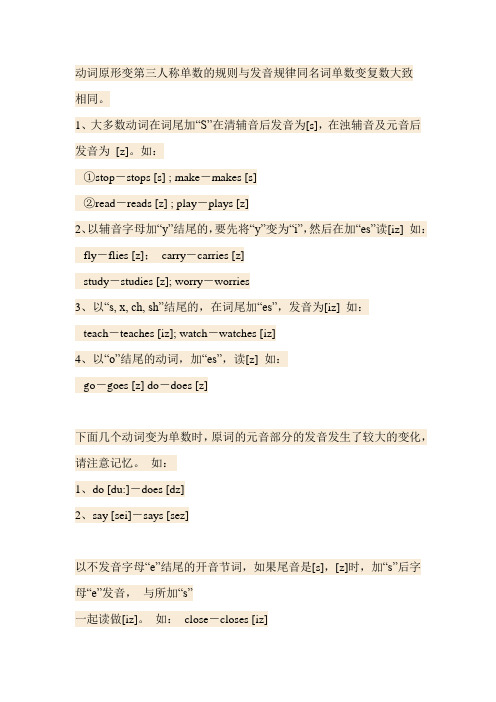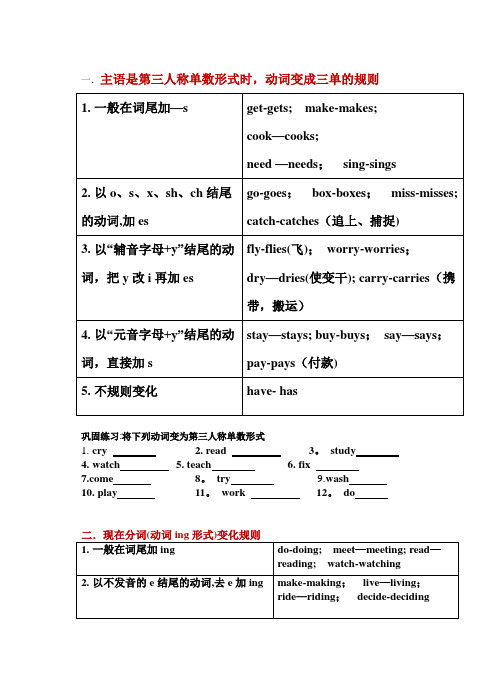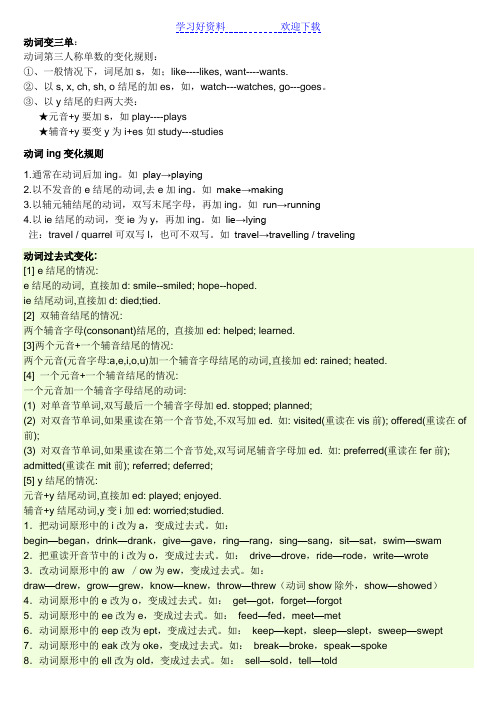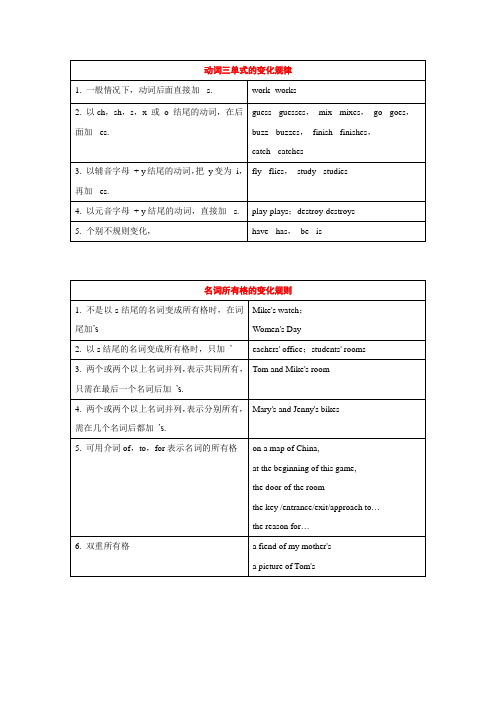动词变单三式的变化规则
(完整版)动词变第三人称单数规则

动词原形变第三人称单数的规则与发音规律同名词单数变复数大致相同。
1、大多数动词在词尾加“S”在清辅音后发音为[s],在浊辅音及元音后发音为[z]。
如:①stop-stops [s] ; make-makes [s]②read-reads [z] ; play-plays [z]2、以辅音字母加“y”结尾的,要先将“y”变为“i”,然后在加“es”读[iz] 如: fly-flies [z];carry-carries [z]study-studies [z]; worry-worries3、以“s, x, ch, sh”结尾的,在词尾加“es”,发音为[iz] 如:teach-teaches [iz]; watch-watches [iz]4、以“o”结尾的动词,加“es”,读[z] 如:go-goes [z] do-does [z]下面几个动词变为单数时,原词的元音部分的发音发生了较大的变化,请注意记忆。
如:1、do [du:]-does [dz]2、say [sei]-says [sez]以不发音字母“e”结尾的开音节词,如果尾音是[s],[z]时,加“s”后字母“e”发音,与所加“s”一起读做[iz]。
如:close-closes [iz]be动词包括:am,is,are。
第三人称单数用is;过去式为was;复数用are,过去式为were.除上述规律外,还应注意下面三点:1. 动词have ,遇到主语是第三人称单数时,要用has;动词be 的第三人称单数形式是is。
2. 含有动词第三人称单数形式的句子变否定句时,要用doesn't + 动词原形,如:He goes to school at six in the morning. (变否定句)→ He doesn't go to school at six in the morning.3. 对含有动词第三人称单数形式的句子提问时,要用助动词does,如:She goes home at five every day. (对划线部分提问)→ When / What time does she go home every day?一般现在时中的第三人称单数形式在一般现在时中,当主语是第三人称单数时,谓语动词要用第三人称单数形式,即常在动词原形后加-s或-es。
动词的三单、现分、过去式的变化规则

have- has
巩固练习:将下列动词变为第三人称单数形式
1.cry2. read3。study
4.watch5.teach6. fix
e8。try9.wash
10. play11。work12。do
二.现在分词(动词ing形式)变化规则
1.一般在词尾加ing
do-doing; meet—meeting; read—reading; watch-watching
一.主语是第三人称单数形式时,动词变成三单的规则
1.一般在词尾加—s
get-gets; make-makes; cook—cooks;
need —needs;sing-sings
2.以o、s、x、sh、ch结尾的动词,加es
go-goes;box-boxes;miss-misses;
catch-catches(追上、捕捉)
5.不规则变化
put-put;read—read; send-sent;burn-burnt; grow—grew
know—knew; keep- kept
巩固练习:将下列动词变成过去式
1。write2。like3. study
4。play5。meet6.stop
7.plan8。sit9.get
10。build11. begin12. eat
三.动词过去式(或过去分词)的变化规则
1.一般在词尾加ed
watch—watched;open—opened;
ask—asked; help-helped
2.以不发音的e结尾的动词,在词尾直接加d
close—closed;live—lived;
hope—hoped;
动词的变化规则(动词三单,过去式,ing形式)

动词变三单:动词第三人称单数的变化规则:①、一般情况下,词尾加s,如;like----likes, want----wants.②、以s, x, ch, sh, o结尾的加es,如,watch---watches, go---goes。
③、以y结尾的归两大类:★元音+y要加s,如play----plays★辅音+y要变y为i+es如study---studies动词ing变化规则1.通常在动词后加ing。
如play→playing2.以不发音的e结尾的动词,去e加ing。
如make→making3.以辅元辅结尾的动词,双写末尾字母,再加ing。
如run→running4.以ie结尾的动词,变ie为y,再加ing。
如lie→lying注:travel / quarrel可双写l,也可不双写。
如travel→travelling / traveling动词过去式变化:[1] e结尾的情况:e结尾的动词, 直接加d: smile--smiled; hope--hoped.ie结尾动词,直接加d: died;tied.[2] 双辅音结尾的情况:两个辅音字母(consonant)结尾的, 直接加ed: helped; learned.[3]两个元音+一个辅音结尾的情况:两个元音(元音字母:a,e,i,o,u)加一个辅音字母结尾的动词,直接加ed: rained; heated.[4] 一个元音+一个辅音结尾的情况:一个元音加一个辅音字母结尾的动词:(1) 对单音节单词,双写最后一个辅音字母加ed. stopped; planned;(2) 对双音节单词,如果重读在第一个音节处,不双写加ed. 如: visited(重读在vis前); offered(重读在of 前);(3) 对双音节单词,如果重读在第二个音节处,双写词尾辅音字母加ed. 如: preferred(重读在fer前); admitted(重读在mit前); referred; deferred;[5] y结尾的情况:元音+y结尾动词,直接加ed: played; enjoyed.辅音+y结尾动词,y变i加ed: worried;studied.1.把动词原形中的i改为a,变成过去式。
动词三单的变化规律

Women'' office;students' rooms
3.两个或两个以上名词并列,表示共同所有,只需在最后一个名词后加’s.
Tom and Mike's room
4.两个或两个以上名词并列,表示分别所有,需在几个名词后都加’s.
3.以辅音字母+ y结尾的动词,把y变为i,再加-es.
fly - flies,study - studies
4.以元音字母+ y结尾的动词,直接加-s.
play-plays;destroy-destroys
5.个别不规则变化,
have - has,be - is
名词所有格的变化规则
1.不是以s结尾的名词变成所有格时,在词尾加’s
Mary's and Jenny's bikes
5.可用介词of,to,for表示名词的所有格
on a mapof China,
atthe beginning of this game,
the door of the room
the key /entrance/exit/approach to…
the reason for…
动词三单式的变化规律
1.一般情况下,动词后面直接加-s.
work -works
2.以ch,sh,s,x或o结尾的动词,在后面加-es.
guess - guesses,mix - mixes,go - goes,
buzz - buzzes,finish - finishes,
catch - catches
6.双重所有格
a fiend of my mother's
英语动词第三人称单数形式的变化规则

英语动词第三人称单数改变规则通常现在时肯定句中,主语为第三人称单数动词改变关键表现在词尾改变上,其规律为:1、变否定句:含有动词第三人称单数形式句子变否定句时,要在动词前面加上doesn’t 或does not,动词第三人称单数形式要还原成原形:格式为doesn’t/does not + 动词原形,如:He goes to school at six in the morning. (变否定句)→He doesn't go to school at six in the morning.2、变通常疑问句:把含有动词第三人称单数形式变成通常疑问句时,要借用助动词does,如:She goes home at five every day.→Does she go home at five every day?--- Yes, she does./No, she doesn’t.3、对划线部分进行提问(变特殊疑问句):通常格式为Whxxx + 通常疑问句?She goes home at five every day. (对划线部分提问)→When/What time does she go home every day?She goes home at five every day. (对划线部分提问)→Who goes home at five every day?She goes home at five every day. (对划线部分提问)→What does she do at five every day?哪些主语是第三人称单数?1、人称代词he, she, it;如:He likes watching TV. 她喜爱看电视。
She has lunch at twelve. 她十二点吃午餐。
It looks like a cat. 它看起来像只猫。
2、单个人名、地名或称呼作主语;是第三人称单数。
英语动词第三人称单数形式的变化规则

英语动词《第三人称单数形式》的变化规则英语动词第三人称单数变化规则一般现在时的肯定句中,主语为第三人称单数的动词变化主要体现在词尾的变化上,其规律为:1、变否定句:含有动词第三人称单数形式的句子变否定句时,要在动词前面加上doesn't 或does not,动词的第三人称单数形式要还原成原形:格式为doesn't/does not + 动词原形,如:He goes to school at six in the morning. (变否定句)→He doesn't go to school at six in the morning.2、变一般疑问句:把含有动词第三人称单数形式的变成一般疑问句时,要借用助动词does,如:英语动词《第三人称单数形式》的变化规则She goes home at five every day.→Does she go home at five every day?--- Yes, she does./No, she doesn't.哪些主语是第三人称单数?人称代词he, she, it; 1、如:He likes watching TV. 他喜欢看电视。
She has lunch at twelve. 她十二点吃午餐。
It looks like a cat. 它看起来像只猫。
2、单个人名、地名或称呼作主语;是第三人称单数。
如:Han Mei looks like her mother. xx看起来像她的母亲。
is in . xx在xx。
Uncle Wang often makes cakes. xx叔叔经常做蛋糕。
3、单数可数名词或this / that / the + 单数可数名词作主语时,是第三人称单数;A horse is a useful animal. 马是有用的动物。
This book is yours. 这本书是你的。
That car is red. 那辆小汽车是红色的。
动词变第三人称单数规则
be动词包括:am, is, are。
第三人称单数用 is;过去式为 was;复数用are,过去式为were.除上述规律外,还应注意下面三点:1. 动词 have ,遇到主语是第三人称单数时,要用 has;动词be 的第三人称单数形式是is。
2. 含有动词第三人称单数形式的句子变否定句时,要用doesn't + 动词原形,如:He goes to school at six in the morning. (变否定句)→ He doesn't go to school at six in the morning.3. 对含有动词第三人称单数形式的句子提问时,要用助动词does,如:She goes home at five every day. (对划线部分提问)→ When / What time does she go home every day一般现在时中的第三人称单数形式在一般现在时中,当主语是第三人称单数时,谓语动词要用第三人称单数形式,即常在动词原形后加-s或-es。
I 什么是一般现在时一般现在时的基本用法有哪些呢【No. 1】一般现在时的功能1.表示事物或人物的特征、状态。
如:The sky is blue.天空是蓝色的。
2.表示经常性或习惯性的动作。
如:I get up at six every day.我每天六点起床。
标志词(时间状语):always, every week (day, year, month…), once a week,every…, sometimes, at…, on Sunday uauslly often,never,hardly..........3.表示客观现实。
如:The earth goes around the sun.地球绕着太阳转。
【No. 2】一般现在时的构成1. be动词:主语+be(am,is,are)+其它。
如:I am a boy.我是一个男孩。
动词的变化规则(动词三单,过去式,ing形式)
动词变三单:动词第三人称单数的变化规则:①、一般情况下,词尾加s,如;like----likes, want----wants.②、以s, x, ch, sh, o结尾的加es,如,watch---watches, go---goes。
③、以y结尾的归两大类:★元音+y要加s,如play----plays★辅音+y要变y为i+es如study---studies动词ing变化规则1.通常在动词后加ing。
如play→playing2.以不发音的e结尾的动词,去e加ing。
如make→making3.以辅元辅结尾的动词,双写末尾字母,再加ing。
如run→running4.以ie结尾的动词,变ie为y,再加ing。
如lie→lying注:travel / quarrel可双写l,也可不双写。
如travel→travelling / traveling动词过去式变化:[1] e结尾的情况:e结尾的动词, 直接加d: smile--smiled; hope--hoped.ie结尾动词,直接加d: died;tied.[2] 双辅音结尾的情况:两个辅音字母(consonant)结尾的, 直接加ed: helped; learned.[3]两个元音+一个辅音结尾的情况:两个元音(元音字母:a,e,i,o,u)加一个辅音字母结尾的动词,直接加ed: rained; heated.[4] 一个元音+一个辅音结尾的情况:一个元音加一个辅音字母结尾的动词:(1) 对单音节单词,双写最后一个辅音字母加ed. stopped; planned;(2) 对双音节单词,如果重读在第一个音节处,不双写加ed. 如: visited(重读在vis前); offered(重读在of 前);(3) 对双音节单词,如果重读在第二个音节处,双写词尾辅音字母加ed. 如: preferred(重读在fer前); admitted(重读在mit前); referred; deferred;[5] y结尾的情况:元音+y结尾动词,直接加ed: played; enjoyed.辅音+y结尾动词,y变i加ed: worried;studied.1.把动词原形中的i改为a,变成过去式。
动词的第三人称单数现在式变化规则
动词的第三人称单数现在式变化规则一般情况下,英语动词的第三人称单数现在式变化规则如下:
1. 对于大多数动词,直接在动词后加上-s。
例如:play → plays, walk → walks。
2. 如果动词以s、x、ch、sh或o结尾,可以在动词后加上-es。
例如:miss → misses, fix → fixes, watch → watches, go → goes。
3. 如果动词以辅音字母+y结尾,将y改为i,再加上-es。
例如:study → studies, fly → flies。
4. 如果动词以元音字母+y结尾,直接在动词后加上-s。
例如:play → plays, enjoy → enjoys。
需要注意的是,有一些动词的第三人称单数形式不符合以上规则,需要单独记忆,如:be → is, have → has, do → does, go → goes。
英语动词单三变化规则及名词单数变复数口诀
动词的第三人称单数现在式变化规则:1)一般由动词原形加-sget-gets play-plays2)以㊀结尾的动词,加-slike-likes make-makes3)以0结尾的动词加-esgo-goes do-does以s, x, ch, sh等字母结尾的动词,后面加-eskiss-kisses fix-fixes teach-teaches fish-fishes4)以辅音字母加丫结尾的动词,先将y变i,再加-es fly-flies study-studies5) have —has一般现在时主语+动词原型VI have a friend. You have a friend. We have a friend. They have a frie nd. 主语(第三人称单数)+动词V (三单)She / He / It has a friend.Tom / My mother has a friend.名词单数变复数口诀(一)规则变化名词单数变复数,直接加-s占多数;s, x, z, ch, sh来结尾,直接加上-es ;词尾是f或fe,加-s之前先变ve;辅母+ y在词尾,把y变i再加-es;词尾字母若是o,常用三个已足够,要力口-es 请记好,hero, tomato, potato。
(二)不规则变化男人女人a变e,鹅足牙oo变ee ;老鼠虱婆也好记,ous变ic;孩子加上ren,鱼鹿绵羊不用变。
This---these(这些)that -- those(那些)【解说】1.英语名词有单数和复数的区别,单数表示“一”,复数表示“多于一。
”名词由单数变复数,多数是规则的变,直接加-s,例如:book— books, girl — girls。
但以-s, -z, -x, -ch, -sh 结尾的名词,变成复数时加-es, 例如:bus—buses, buzz —buzzes, box— boxes, watch — watches, brush — brushes2.-f(e)结尾的名词单数变复数歌诀:①树叶半数自已黄,妻子拿刀去割粮,架后窜出一只狼,就像强盗逃命忙。
- 1、下载文档前请自行甄别文档内容的完整性,平台不提供额外的编辑、内容补充、找答案等附加服务。
- 2、"仅部分预览"的文档,不可在线预览部分如存在完整性等问题,可反馈申请退款(可完整预览的文档不适用该条件!)。
- 3、如文档侵犯您的权益,请联系客服反馈,我们会尽快为您处理(人工客服工作时间:9:00-18:30)。
• 一、写出下列动词的第三人称单数
• drink ________ go _______ stay ________ make ________
• look _________ have_______ pass_______ carry ____
• come________ watch______ plant_______ fly ________
• 19. Su Hai and Su Yang _______(have) eight lessons this term.
• 20. -What day _______(be) it today? It’s Saturday.
• 三、按照要求改写句子 • 1. Daniel watches TV every evening.(改为
• 8. The girl _______(teach) us English on Sundays.
• 9. She and I ________(take) a walk together every evening.
• 10. There ________(be) some water in the bottle.
• 五、改错(划出错误的地方,将正确的写在横 线上)
• 1. Is your brother speak English? __________________
• 2. Does he likes going fishing? __________________
• 3. He likes play games after class. __________________
• study_______ do_________ teach_______
• 二、用括号内动词的适当形式填空。 • 1. He often ________(have) dinner at
home.
• 2. Daniel and Tommy _______(be) in Class One.
• 3. We _______(not watch) TV on Monday.
回答)ቤተ መጻሕፍቲ ባይዱ
• __________________________________ • 4. Amy likes playing computer games.(改
为一般疑问句,作否定回答)
• 5. We go to school every morning.(改为否 定句)
• __________________________________ • 6. He speaks English very well.(改为否定
• 4. Nick _______(not go) to the zoo on Sunday.
• 5. ______ they ________(like) the World Cup?
• 6. What _______they often _______(do) on Saturdays?
• 7. _______ your parents _______(read) newspapers every day?
• __________________________________ • 9. She is always a good student.(改为一般
疑问句,作否定回答)
• __________________________________ _________________ _____
• 10. Simon and Daniel like going skating.(改为否定句)
• 4. Mr. Wu teachs us English. __________________
• 5. She don’t do her homework on Sundays. _________
句)
• __________________ • 7. I like taking photos in the park.(对划线部
分提问)
• __________________________________ • 8. John comes from Canada.(对划线部分
提问)
• 8. John comes from Canada.(对划线部分 提问)
否定句)
• __________________________________ • 2. I do my homework every day.(改为一般
疑问句,作否定回答)
• __________________________________ • 3. She likes milk.(改为一般疑问句,作肯定
• 15. I _______(be) ill. I’m staying in bed. • 16. She _______(go) to school from
Monday to Friday.
• 17. Liu Tao _______(do) not like PE.
• 18. The child often _______(watch) TV in the evening.
动词变单三式的变化规则
1.一般情况下,在动词后直接加-s
例如:works gets says reads
2.以s. x. sh. ch. o结尾,加-es 例如: go-goes teach-,teaches wash-washes catch-catches do-does
3.以“辅音字母+y”结尾,变y为i, 再加-es fly-flies study-studies
• 11. Mike _______(like) cooking.
• 12. They _______(have) the same hobby.
• 13. My aunt _______(look) after her baby carefully.
• 14. You always _______(do) your homework well.
